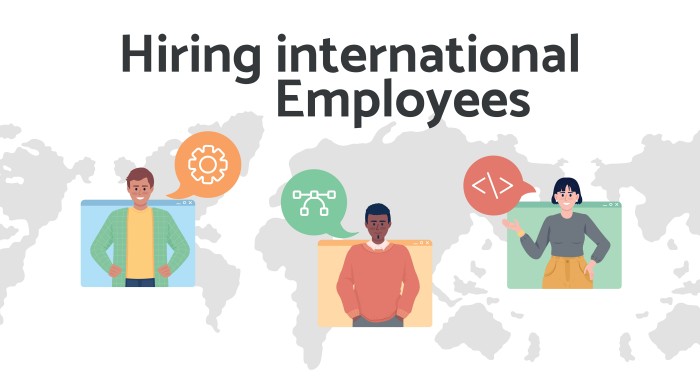
Employing Remote Overseas Workers
Understanding the Basics of Employing Remote Overseas Workers
Let’s look at the burgeoning trend of employing remote overseas workers. You might already know that this practice has been gaining popularity, largely due to technology advances and the seismic shift towards remote work sparked by recent global events. With this trend, businesses like yours can tap into a global talent pool, bring diverse perspectives to your team, and even enjoy cost savings.
However, employing overseas workers is not without its own set of challenges, which include:
- Navigating different employment laws
- Handling potential language barriers
- Managing cultural differences
- Coping with time zone variances
Despite these hurdles, the benefits can outweigh the challenges if you’re well-prepared. Being informed and proactive in understanding the various elements can set you on the path to success.
So, let’s first debunk a common myth: the idea that overseas workers are somehow less protected by law.
This is not the case. In fact, overseas workers are covered by local laws in their country of residence, and in some situations, they may also have rights under UK law. It’s crucial to grasp this to avoid potential legal disputes down the line.
You might find the digital economy encouraging remote overseas employment. With the rise of the gig economy and digital platforms, hiring overseas is becoming increasingly seamless. The result is a global talent pool at your fingertips. It’s an enticing prospect, but one that requires sound legal and logistical planning.
If you are wondering about the impact on company culture, even with a distributed team, maintaining a cohesive and inclusive company culture is possible. Regular communication, collaboration tools, and team building can work wonders in bridging geographical gaps. Plus, the diversity brought by international hires can enrich your company culture, fostering creativity and innovation.
To summarise, here’s what you need to remember about the basics of remote overseas employment:
- Understand the legal protections for overseas workers
- Leverage the opportunities offered by the digital economy
- Cultivate a cohesive company culture despite geographical distances
The Legal Implications of Employing Remote Overseas Workers
So, you’re ready to explore the legal landscape of employing remote overseas workers. Don’t fret, it’s a complex terrain but together we’ll chart a course that makes it easier to navigate.
At the heart of the matter lies the challenge of jurisdiction. In a nutshell, jurisdiction refers to the power of a country’s law over a certain matter or person. When hiring overseas, you could potentially be dealing with two different jurisdictions – the UK and the worker’s country of residence. This is where things can get tricky.
Here’s what you need to bear in mind:
- Each country has its own employment laws
- The laws applicable could be a mix of UK and foreign law
- The interpretation and application of these laws can vary greatly
It’s paramount to understand the legal framework of the worker’s country of residence. This includes labour laws, employee rights, taxation, and data protection. In some instances, the local laws might be more beneficial to the employee than the UK law.
International Labour Standards
There are international labour law standards, established by organizations like the International Labour Organization, that provide a common ground. These conventions cover fundamental principles and rights at work. Ensuring your practices align with these standards is a great place to start.
Let’s shift focus to liability. In case of a legal dispute, it’s important to understand where the liability falls. A key point to remember is:
- Disputes could be handled either in the UK or the worker’s country
Therefore, you need to consider potential legal ramifications and prepare accordingly. It’s wise to consult with a legal expert with knowledge in the worker’s country’s law, or even better, an international employment law specialist.
The legal implications of employing remote overseas workers are indeed complex, but not insurmountable. As we venture into these legal waters, remember:
- Understand the legal jurisdictions involved
- Familiarize yourself with international labour law standards
- Consider potential legal liabilities
With a solid understanding of these legal intricacies, you’re well on your way to making informed decisions.
Navigating Immigration and Right to Work Regulations
Now, let’s tackle a pivotal aspect of employing remote overseas workers: immigration and right to work regulations. This area might seem unrelated at first – after all, your workers won’t be relocating to the UK. Yet, it’s critical to your operations and overall compliance.
The right to work pertains to an individual’s legal entitlement to carry out work in a particular country. It’s not just about the physical presence but also involves:
- Permission to work in their country of residence
- Applicable work permits or visas, if any
- Verifying these details thoroughly
In the UK, employers have a responsibility to prevent illegal working by conducting right to work checks. But what about when the worker is abroad? Although there’s no equivalent requirement under UK law, it’s best to exercise due diligence. You should:
- Check if the worker has the right to work in their own country
- Keep a copy of the relevant documents as evidence
- Consult a local legal expert for further clarity
Visas
Moving on to visas, this is where you’ll need to be extra careful. For instance, even if an overseas worker is providing services to a UK company, they may not require a UK work visa. But, the situation can vary based on the specific circumstances and the laws of the worker’s country. It’s always wise to:
- Understand the visa requirements in the worker’s country
- Seek legal advice if there’s any ambiguity
The stakes are high when it comes to immigration and right to work regulations. Non-compliance could lead to hefty penalties and reputational damage. To navigate this, remember:
- Validate the worker’s right to work in their own country
- Understand the specific visa requirements, if any
- Seek legal advice as needed
With these pointers in mind, you’re now equipped to manage immigration and right to work regulations effectively.
Employment Contracts and Tax Implications for Remote Overseas Workers
Now that we’ve looked at the legal landscape and immigration requirements, let’s look into the nitty-gritty of employment contracts and tax implications. Both are crucial to ensuring a smooth, compliant and mutually beneficial employment relationship.
Firstly employment contracts. A well-crafted contract is the cornerstone of a sound employment relationship. It clearly outlines the rights, responsibilities and expectations for both parties. For overseas workers, there are some unique factors to consider:
- Define the nature of the employment relationship
- Specify the governing law for the contract
- Include terms about working hours, holidays and remuneration
- Detail the mechanisms for dispute resolution
In essence, the contract must be fair, clear and in line with the relevant employment laws. It’s best to seek legal advice to ensure all bases are covered.
Tax
You need to understand tax obligations both in the UK and in the worker’s country. Here’s a simple breakdown:
- Understand the UK’s double taxation agreements
- Check if the worker is liable for UK income tax
- Ensure the worker is aware of their own tax obligations
As a rule of thumb, if the worker is a tax resident in their own country and doesn’t have a permanent base in the UK, they’re unlikely to be liable for UK income tax. But, tax laws are complex and it’s always wise to consult with a tax specialist.
In summary, when dealing with employment contracts and tax implications, it’s key to:
- Prepare a comprehensive employment contract
- Understand the UK’s tax laws and the worker’s local tax laws
- Seek advice from legal and tax experts
By understanding these elements, you’re set to build a strong and compliant foundation for employing remote overseas workers.
Best Practices for Managing and Supporting
Let me share some essential practices to help you manage and support your overseas workers. At the heart of successful management lies clear and consistent communication. Foster an environment where regular check-ins are routine, varied communication channels are leveraged, and open dialogue is promoted. Remember, one communication method won’t suit all, so tailor your approach to resonate with different cultural nuances in your team.
Embrace the diversity that comes with an international team. This is a boon, not a bane, so make it a point to acknowledge and respect each individual’s cultural background. Equip your team with diversity and inclusion training to foster an inclusive work environment. This is not just about maintaining harmony; it also fuels creativity, innovation, and broader perspectives.
One practical aspect you can’t overlook is the management of time zone differences.
This could seem like a scheduling nightmare, but don’t worry, there are strategies to handle it. Opt for flexible working arrangements wherever possible and use shared calendars for transparency. Be considerate while scheduling meetings; ensure it’s a reasonable time for all attendees.
Lastly, never underestimate the importance of employee well-being. Remote work can sometimes blur the lines between professional and personal life, leading to burnout. To mitigate this, encourage a healthy work-life balance. Provide access to mental health resources and urge your team to take regular breaks to recharge.
To sum up, effective management of your remote overseas team requires clear communication, cultural inclusivity, smart handling of time zone differences, and a keen focus on employee well-being. This journey, though complex, can be incredibly rewarding with the right approach. As you navigate through the evolving digital economy, remember that adaptability, empathy, and proactivity are your guiding stars. Together, let’s redefine the future of work.
Call John Bloor at EBS Law on 01625 87 4400 if you are an employer and need free Employment Law Advice.

